Environment driving BHP’s investments in nickel
Nickel, traditionally largely consumed in the stainless steel industry, is enjoying strong support from its role as a lithium-ion battery enhancing metal.
The use of nickel reduces the need for cobalt, significantly battery reducing costs. Not surprisingly car makers are scrambling to lock up supplies as Chinese battery firms get first to market investing in mines and refining.
Want more from MetalMiner? We offer exclusive analyst commentary in our weekly updates – all metals, no sales fluff.
BHP signs Tesla supply deal
BHP, for example, signed a deal last year to supply Tesla with nickel from its west Australian mine as demand from the EV market finally — after years of promise but poor uptake — begins to ramp up.
Traditionally, the stainless market has demanded purity and price. However, the battery market is also demanding as low a carbon footprint as possible from all its material suppliers (aluminum, nickel, cobalt, etc.).
That, in part, is what is behind BHP’s investment in a small, London-based nickel miner Kabanga Nickel Ltd.
According to the Financial Times, Kabanga is regarded as the world’s largest development-ready, high-grade nickel sulphide deposit. However, its remote location in the northwest of Tanzania, close to the border with Burundi and Rwanda, makes the prospect of ore transportation to a third country for processing expensive and carbon-loaded.
But BHP and Kabanga plan to use an environmentally less damaging hydrometallurgical refining process on site. They plan to only transport refined product to world markets, improving the economics and dramatically reducing the carbon footprint.
According to the Financial Post, BHP will initially invest U.S. $40 million in Kabanga Nickel. It will also invest U.S. $10 million in Lifezone, which owns the processing technology. That will give BHP an 8.9% equity stake in Kabanga Nickel from its initial investment. The firm intends to raise that to 17.8% after it makes an additional U.S. $50 million investment subject to targets being met.
BHP’s purchase of a stake in Kabanga values the project at U.S. $658 million. The junior miner is also seeking to raise further funding for a planned start in 2025, with the aim of producing about 40,000 tons of nickel, 6,000 tons of copper and 3,000 tons of cobalt.
Change in approach
Investing in juniors like this is something of a change of approach for BHP.
However, it signals the firm’s belief that the market is underserved with good-quality, environmentally low impact resources in relatively stable locations.
The firm’s own investments have largely been in Australia, Chile and Canada. The largest producing country, however, is Indonesia. Indonesia remains a major supplier to China, but its heavy reliance on coal-fired power production is gradually reducing its attractiveness to Western battery and automakers keen to burnish their brands’ environmental credentials.
BHP’s relatively minor stake may, therefore, prove a good investment in the years ahead.
All the metals intelligence, including stainless and nickel, you need in one user-friendly platform with unlimited usage — request a MetalMiner Insights platform demo.




Leave a Reply